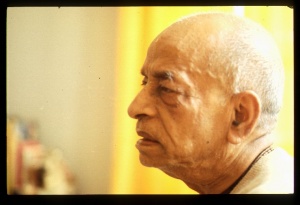CC Madhya 24.108: Difference between revisions
m (1 revision(s)) |
(Vanibot #0054 edit - transform synonyms into clickable links, which search similar occurrences) |
||
| (One intermediate revision by one other user not shown) | |||
| Line 1: | Line 1: | ||
{{ | [[Category:Sri Caitanya-caritamrta - Madhya-lila Chapter 24|C108]] | ||
<div style="float:left">'''[[Sri Caitanya-caritamrta|Śrī Caitanya-caritāmṛta]] - [[CC Madhya|Madhya-līlā]] - [[CC Madhya 24|Chapter 24: The Sixty-One Explanations of the Atmārāma Verse]]'''</div> | |||
<div style="float:right">[[File:Go-previous.png|link=CC Madhya 24.107|Madhya-līlā 24.107]] '''[[CC Madhya 24.107|Madhya-līlā 24.107]] - [[CC Madhya 24.109|Madhya-līlā 24.109]]''' [[File:Go-next.png|link=CC Madhya 24.109|Madhya-līlā 24.109]]</div> | |||
{{CompareVersions|CC|Madhya 24.108|CC 1975|CC 1996}} | |||
{{RandomImage}} | |||
==== TEXT 108 ==== | ==== TEXT 108 ==== | ||
<div | <div class="verse"> | ||
kevala brahmopāsaka tina bheda haya | :kevala brahmopāsaka tina bheda haya | ||
sādhaka, brahmamaya, āra prāpta-brahma-laya | :sādhaka, brahmamaya, āra prāpta-brahma-laya | ||
</div> | </div> | ||
| Line 12: | Line 16: | ||
==== SYNONYMS ==== | ==== SYNONYMS ==== | ||
<div | <div class="synonyms"> | ||
kevala brahma- | ''[//vanipedia.org/wiki/Special:VaniSearch?s=kevala&tab=syno_o&ds=1 kevala] [//vanipedia.org/wiki/Special:VaniSearch?s=brahma&tab=syno_o&ds=1 brahma]-[//vanipedia.org/wiki/Special:VaniSearch?s=upāsaka&tab=syno_o&ds=1 upāsaka]'' — the worshiper of only the impersonal Brahman; ''[//vanipedia.org/wiki/Special:VaniSearch?s=tina&tab=syno_o&ds=1 tina] [//vanipedia.org/wiki/Special:VaniSearch?s=bheda&tab=syno_o&ds=1 bheda] [//vanipedia.org/wiki/Special:VaniSearch?s=haya&tab=syno_o&ds=1 haya]'' — there are three different groups; ''[//vanipedia.org/wiki/Special:VaniSearch?s=sādhaka&tab=syno_o&ds=1 sādhaka]'' — the beginner; ''[//vanipedia.org/wiki/Special:VaniSearch?s=brahma&tab=syno_o&ds=1 brahma]-[//vanipedia.org/wiki/Special:VaniSearch?s=maya&tab=syno_o&ds=1 maya]'' — absorbed in thought of Brahman; ''[//vanipedia.org/wiki/Special:VaniSearch?s=āra&tab=syno_o&ds=1 āra]'' — and; ''[//vanipedia.org/wiki/Special:VaniSearch?s=prāpta&tab=syno_o&ds=1 prāpta]-[//vanipedia.org/wiki/Special:VaniSearch?s=brahma&tab=syno_o&ds=1 brahma]-[//vanipedia.org/wiki/Special:VaniSearch?s=laya&tab=syno_o&ds=1 laya]'' — actually merged into the Brahman effulgence. | ||
</div> | </div> | ||
| Line 19: | Line 23: | ||
==== TRANSLATION ==== | ==== TRANSLATION ==== | ||
<div | <div class="translation"> | ||
"There are three types of people who worship the impersonal Brahman. The first is the beginner, the second is one whose thoughts are absorbed in Brahman, and the third is one who is actually merged in the impersonal Brahman. | |||
</div> | </div> | ||
__NOTOC__ | |||
<div style="float:right; clear:both;">[[File:Go-previous.png|link=CC Madhya 24.107|Madhya-līlā 24.107]] '''[[CC Madhya 24.107|Madhya-līlā 24.107]] - [[CC Madhya 24.109|Madhya-līlā 24.109]]''' [[File:Go-next.png|link=CC Madhya 24.109|Madhya-līlā 24.109]]</div> | |||
__NOTOC__ | |||
__NOEDITSECTION__ | |||
Latest revision as of 23:01, 19 February 2024
Śrī Caitanya-caritāmṛta - Madhya-līlā - Chapter 24: The Sixty-One Explanations of the Atmārāma Verse

His Divine Grace
A.C. Bhaktivedanta Swami Prabhupada
A.C. Bhaktivedanta Swami Prabhupada
TEXT 108
- kevala brahmopāsaka tina bheda haya
- sādhaka, brahmamaya, āra prāpta-brahma-laya
SYNONYMS
kevala brahma-upāsaka — the worshiper of only the impersonal Brahman; tina bheda haya — there are three different groups; sādhaka — the beginner; brahma-maya — absorbed in thought of Brahman; āra — and; prāpta-brahma-laya — actually merged into the Brahman effulgence.
TRANSLATION
"There are three types of people who worship the impersonal Brahman. The first is the beginner, the second is one whose thoughts are absorbed in Brahman, and the third is one who is actually merged in the impersonal Brahman.